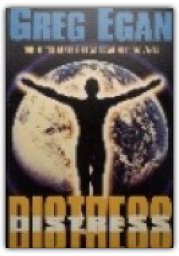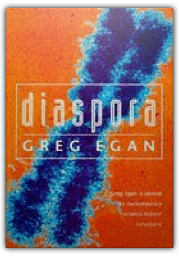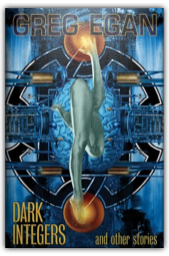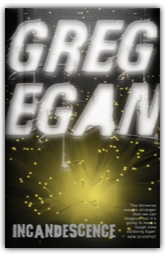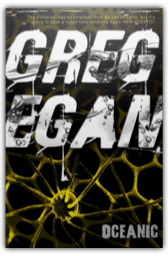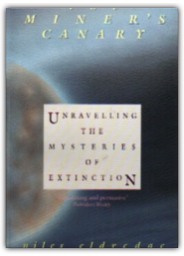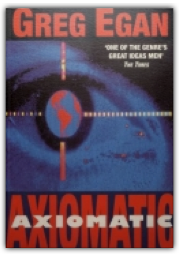 Axiomatic
Greg Egan
Axiomatic
Greg Egan
Australian writer Greg Egan presents 18 of his short stories from the early 1990s in this collection. The blurb on the cover says "Science fiction for people who like science fiction," and experienced and new sci-fi fans alike will agree. The ideas and world-building are light years ahead of the pack.
Highlights include: "The Hundred Light-Year Diary", in which society deals with the mixed blessing of diaries sent back in time to earlier selves; "Eugene", in which a working-class couple decide if, and then to what degree, they should genetically enhance their baby; "The Caress", a science fiction detective story that will leave you feeling disturbed; "The Safe-Deposit Box", in which the narrator seeks to know why he has spent his life waking up every day in a new body; "A Kidnapping", which throws a new light on avatar crime; "Learning To Be Me", a story that recalls some of the Mind's I essays; "Appropriate Love", in which insurance companies pressure a couple in need of medical care; "The Moral Virologist", a tale of a deranged geneticist attempting to redeem the world through a computer virus; and "Closer", about a happy couple who enjoy using the latest technological gadgetry to learn more about each other ... although sometimes they learn too much.
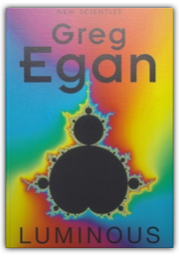 Luminous
Greg Egan
Luminous
Greg Egan
Greg Egan is an Australian with a worldwide perspective—seven of the ten stories in this fine and thoughtful collection appeared in Britain's premier SF magazine Interzone and the rest in America's Asimov's SF Magazine. In a time when it's frequently claimed that SF holds no more surprises Egan casts a coldly innovative eye on old themes like the problem of consciousness: where in the human brain's intricate mess does the "I" actually live? He delivers shocking body-blows to received ideas in thought- experiment stories that like Jorge Luis Borges's philosophical squibs are booby- trapped with terrible truths and paradoxes. Standouts here include the title piece where a supercomputer built from pure light explores a defect in known mathematics that could smash not only the theoretical but the physical universe; "Silver Fire", an unspeakably bleak examination of our need for superstition, however irrational; "Reasons To Be Cheerful", exploring with chilling logic the implications of the likelihood that human emotions are "only" chemical states; "Cocoon", testing liberal sentiments to destruction with a biotechnology that might let parents choose only heterosexual kids; and "The Planck Dive", a one-way trip into a black hole that makes most previous SF versions of this ultimate bungee-jump seem naive. Egan's visions of the future glow with gloomy intellectual fire. Luminous indeed. —David Langford
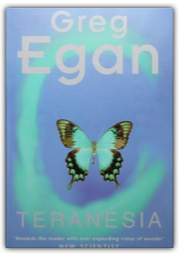 Teranesia
Greg Egan
Teranesia
Greg Egan
Early next century Prabhir spends his childhood on a small Indonesian island where his biologist parents are investigating anomalous butterflies:
"The butterfly—a female twenty centimetres across, with black and iridescent-green wings— clearly belonged to some species of swallowtail: the two hind wings were tipped with long, narrow 'tails' or 'streamers'. But there were puzzling quirks... the pattern of veins in the wings... and the position of the genital openings... How could this one species of swallowtail been isolated longer than any other butterfly in the world?"
A childish prank leads to Prabhir's blaming himself for the violent deaths of his parents, and he devotes the rest of his life to protecting his young sister. At the age of nine he sails with her to safety and later abandons his education to give her a home. Maddie becomes a biologist and takes an interest in the strange creatures now proliferating in the islands; when she goes on a field trip, Prabhir feels obliged to follow... Greg Egan's recent books and short stories of the near future— Distress and Luminous—have combined their intellectually challenging scientific speculations with a good deal of human drama, and Teranesia continues this trend in his work. Prabhir's irrational guilt and obsessive protectiveness make him a memorable flawed protagonist. In the end, though, the point is the wonders. Egan comes up with some fascinating speculation on mechanisms whereby evolution could suddenly go into overdrive and has the good sense not to push conclusions too far; the reader's informed imagination continues well beyond the book's end. All this, and some scathing satire on Critical Theory and Cultural Studies too. —Roz Kaveney
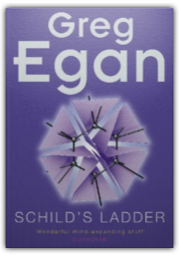 Schild's Ladder
Greg Egan
Schild's Ladder
Greg Egan
Greg Egan's ability to imagine wonders of cosmic scale is shown again in his SF novel Schild's Ladder, with future galactic society confronting a disaster of almost unimaginable vastness—or is it a springboard to new hope?
The fatal experiment was right at the edge of theoretical physics. Could there be an alternative structure for vacuum itself, the void underlying our cosmos? Unfortunately, yes. Once created, this artificial "novo-vacuum" successfully competes with normal space, expanding at half the speed of light in an all-consuming sphere. Inside, physics is radically, incomprehensibly different...
Six centuries later, thousands of inhabited solar systems have been gobbled. Scientists investigating the novo-vacuum from starship Rindler are split between trying to destroy it with tailored spatial viruses ("Planck worms") and hoping to understand the teeming richness beyond that deadly interface.
In a lonely galaxy where only humans are intelligent, whole planets have been evacuated to give microscopic alien organisms their chance to evolve. The novo-vacuum may be bursting with new orders of life, so that killing it would be a monstrous act of genocide. But frightened people dare dreadful things. Violence erupts on the Rindler.
Building up from ideas of human intelligence in disembodied storage or artificial bodies, Egan finally takes his lead characters on a mind-boggling joyride through novo-vacuum, mapping them into a space where a tense eight-hour flight from deadly predators covers just one millimetre. There's a lot of room in there.
Schild's Ladder makes easy reading out of terrifying physics, generating a real sense of wonder even as your jaw drops at the immensity of its implications. —David Langford
|
 Axiomatic
Greg Egan
Axiomatic
Greg Egan
 Luminous
Greg Egan
Luminous
Greg Egan
 Teranesia
Greg Egan
Teranesia
Greg Egan
 Schild's Ladder
Greg Egan
Schild's Ladder
Greg Egan
 Made with Delicious Library
Made with Delicious Library



